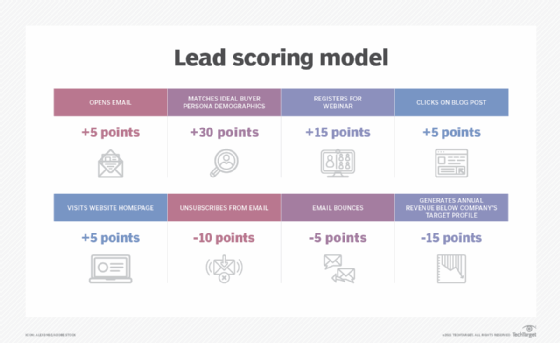marketing-qualified lead (MQL)
What is a marketing-qualified lead (MQL)?
A marketing-qualified lead (MQL) is a website visitor whose engagement levels indicate they are likely to become a customer.
To become an MQL, visitors must demonstrate interest in a website's content. For example, the visitor may have interacted with a website in the following ways:
- Filled in a form.
- Downloaded content.
- Signed up for a newsletter.
- Virtually placed items in a shopping cart.
Each type of interaction is assigned a lead score, a metric that is intended to help sales and marketing personnel determine where the visitor is in the buying cycle. Higher scores indicate a prospective customer that is more likely to buy.
Marketers use lead scoring points to model the buyer's journey of customers. For example, consuming top-of-funnel content, created for users in the research or education stage, receive lower point values. Middle or bottom-of-funnel content, used in the later stages of the buying process, receive higher point values.
It's possible to assign negative scores, too. For example, visits to "careers" or "job openings" pages indicate a job seeker, rather than a potential customer. Visits to those pages can receive negative points, to move prospects farther away from MQL status.
Marketers use marketing automation software to assign point values. The software then maintains lead scores for all leads based on the scoring system.

How to determine the lead scoring point system
To ensure sales and marketing alignment, marketers should involve sales colleagues when determining lead scoring point values and rules. Sales professionals will have a good understanding of the activities customers take prior to making a purchase decision. As a result, sales can provide valuable feedback on the relative point values assigned to each action.
In addition, marketers can interview customers to understand their journey through the company's website and content assets prior to purchasing. Understanding the customer journey can help marketers fine-tune the lead scoring system used to determine MQLs.
If the potential customer is early in the buying cycle, it is usually the marketing department's job to nurture the lead.
MQL vs. SQL
An MQL can be contrasted with a sales-qualified lead (SQL). SQLs often indicate immediate interest in a company's products or services, and a best practice is for a sales representative to act on an SQL within the first 24 hours of discovery.
MQLs, by contrast, are leads of more general interest that may require more education and follow-up to be converted into sales opportunities. MQLs are often placed in an email nurture program, which is created by marketers using marketing automation software. The software automates the sending of emails to MQLs via a pre-determined schedule. The MQLs are scored based on activities such as email opens, clicks, website visits and form completions.
In a sales funnel, an MQL would be at the widest part of the funnel, whereas an SQL would be at the narrowest part of the funnel. Ideally, an MQL that is nurtured through one-to-many promotional e-mails and many-to-many social media marketing efforts will eventually accumulate enough lead points to become an SQL. The exact tipping point for MQL to SQL conversion will vary from company to company, based on anecdotal evidence collected from past sales or from an analysis of marketing data.
The difference between MQLs and SQLs is important because SQL leads are typically nurtured on a one-to-one basis and, if done in person, require more attention and time.
MQL and predictive analytics tools
Large companies often use lead generation software to automate the identification of qualified leads. Several vendors, such as InsideSales, 6sense, Anaplan, Dun & Bradstreet and InsideView, use predictive analytics to offer organizations scored leads. However, some industry observers critique these applications for identifying leads without providing sufficient transparency into the predictive modeling algorithms that could help the company to differentiate between marketing-qualified leads and sales-qualified leads.
Since predictive analytics uses attributes of current customers to model prospective customers, it may be ineffective for a company moving up-market or entering a new market. In this scenario, prospective customers are modeled against existing customers, as opposed to the new customers the company is targeting.
Editor's note: This article was written in 2019. TechTarget editors revised it in 2023 to improve the reader experience.





